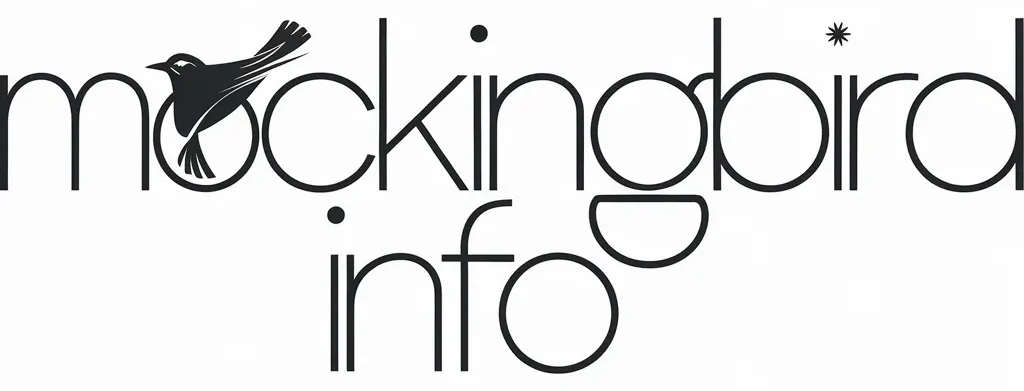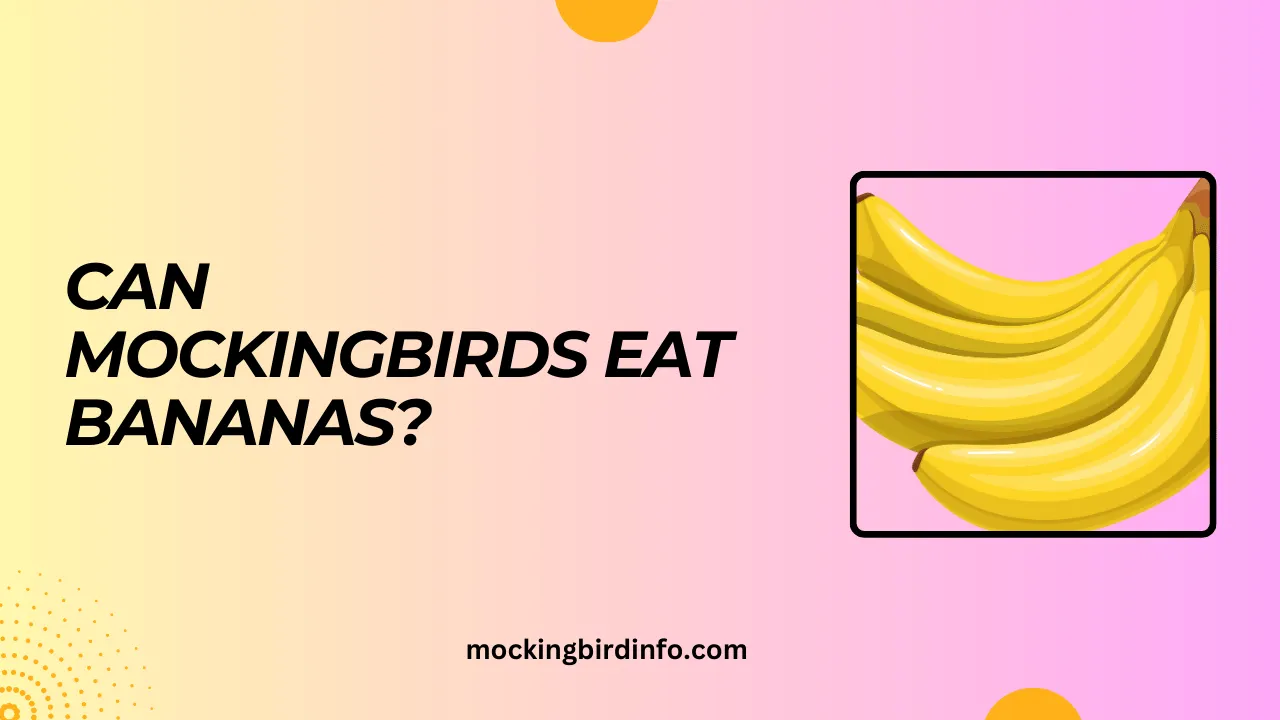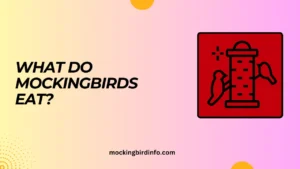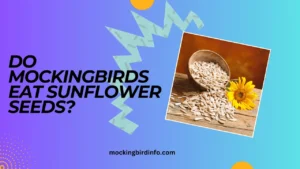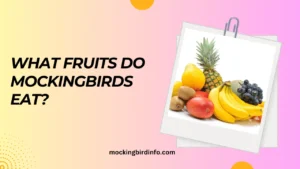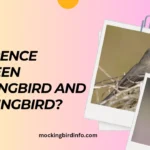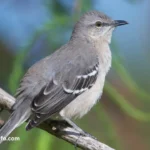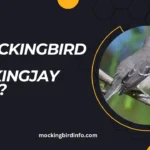Mockingbirds are remarkable creatures, not only for their ability to mimic sounds but also for their adaptability in the wild. As omnivores, these birds have a diverse diet that consists of both animal and plant-based food sources.
This raises the question—can they eat bananas? The answer is nuanced. While mockingbirds can technically consume bananas, these fruits are not a significant part of their natural diet.
Bananas, though soft and sweet, do not align with the types of food that mockingbirds typically seek out in their native habitats. The mockingbird’s diet primarily consists of insects, berries, seeds, and other small fruits.
These foods provide the essential nutrients mockingbirds need to thrive. But, as more people begin to interact with these birds in gardens and backyards, the question of whether we can offer them bananas arises.
While bananas aren’t toxic to mockingbirds, there are several reasons why they should be avoided or given sparingly. This article will explore why bananas may not be the best option for mockingbirds and offer better food alternatives that can contribute to their health and well-being.
Understanding what mockingbirds eat in the wild, how they digest food, and what risks bananas pose will help you become a more responsible and knowledgeable bird feeder. Let’s take a deeper dive into their natural diet and the best practices for feeding these fascinating birds.
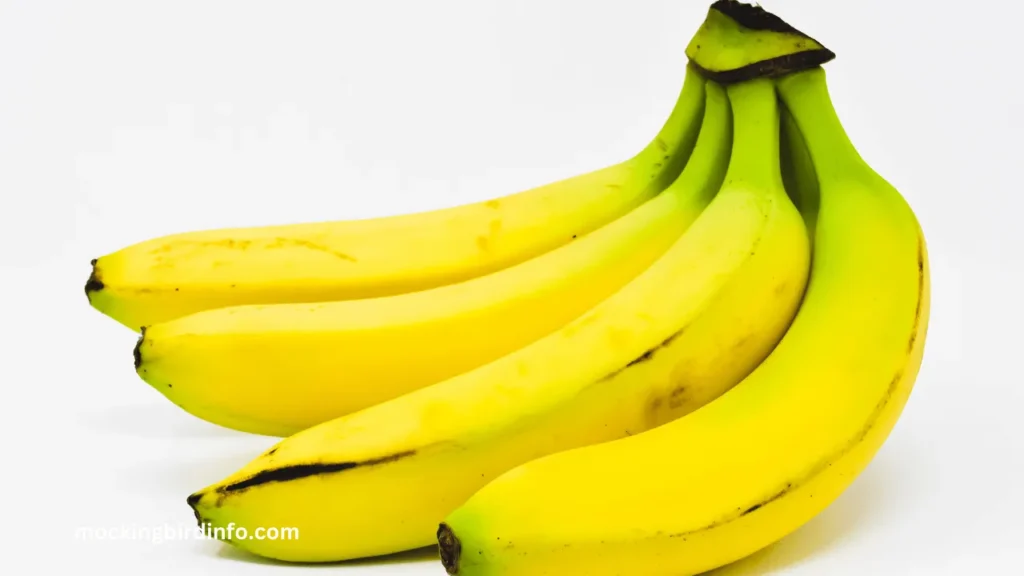
Contents
The Mockingbird’s Natural Diet
Mockingbirds are omnivores, which means they consume both plant and animal-based foods. However, their primary food sources are quite specific and cater to their unique nutritional needs.
Insects: The cornerstone of a mockingbird’s diet consists of insects. Mockingbirds are agile hunters and feed on beetles, grasshoppers, caterpillars, and spiders.
These insects are not only rich in protein but also provide essential fats and vitamins, which are vital for the birds, particularly during their breeding season when they need to provide nourishment for their young.
Insects are the ideal food for mockingbirds because they are high in energy and nutrients that support their active lifestyles.
Fruits: Although mockingbirds are primarily insectivores, they also enjoy a variety of fruits. Native berries such as elderberries, blackberries, blueberries, and raspberries are particularly favored because they offer a high water content and natural sugars.
These fruits are easy to digest and provide a quick source of energy, especially during the late summer and fall, when mockingbirds are preparing for migration or colder weather.
Mockingbirds also eat cherries, grapes, and other soft fruits when they are available in abundance.
Seeds: During the colder months when insects are more difficult to find, mockingbirds turn to seeds. These are an important source of fats and energy.
Common seeds in their diet include sunflower seeds, millet, and nyjer seed. Seeds are not only easy for mockingbirds to access in backyards, but they also provide long-lasting energy, which is essential for surviving the winter months.
The combination of protein from insects, vitamins from fruits, and energy from seeds creates a balanced diet that sustains the mockingbird throughout the year. However, bananas do not typically fit into this mix of foods.
The Mockingbird’s Digestive System
The digestive system of a mockingbird is specially adapted to handle its varied diet. Understanding this system is crucial to grasp why certain foods, like bananas, may not be ideal.
Adaptations for Insect Consumption: Mockingbirds have evolved to handle a high intake of insects. Their strong gizzard helps them break down the hard exoskeletons of insects.
This muscular stomach grinds up the insects to release their nutrients, making it easier for the bird to absorb them.
This adaptation is particularly important for mockingbirds, as insects make up a significant portion of their diet, especially during the warmer months when they are most abundant.
Fruit Digestion: In addition to insects, mockingbirds also consume various fruits. Their digestive system is well-equipped to handle soft fruits like berries and grapes, which are easier to break down.
These fruits provide natural sugars, which give mockingbirds an energy boost. However, the digestive system of a mockingbird may struggle with fruits that are too high in sugar, such as bananas.
The high sugar content of bananas can be difficult for the bird’s system to process, especially when consumed in large amounts.
Mockingbirds are efficient digesters, but their bodies are designed to process protein-rich foods like insects more easily than sugary fruits. Therefore, while bananas can be digested, they may not be the ideal food choice for mockingbirds due to their high sugar content.
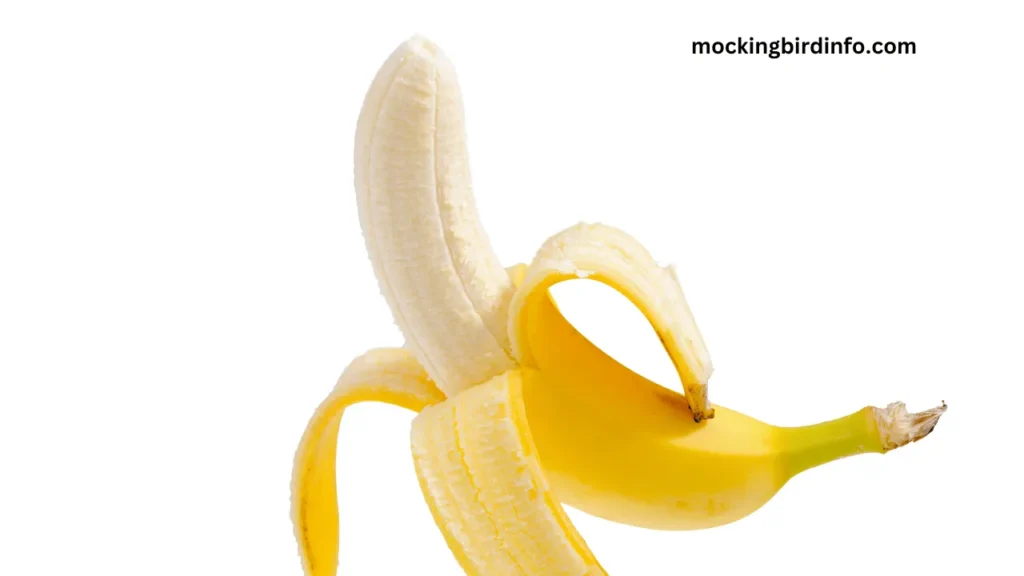
Potential Risks of Consuming Bananas
While bananas are not toxic to mockingbirds, there are a few significant risks involved with feeding them this fruit.
High Sugar Content: Bananas are high in natural sugars. While these sugars may be suitable for humans or other animals that need quick energy, they can be problematic for birds like mockingbirds.
Birds in the wild typically consume foods that are lower in sugar and more balanced in their nutritional content. Excessive sugar intake can lead to health issues like obesity.
For mockingbirds, consuming too much sugar from fruits like bananas could disrupt their natural eating habits and lead to long-term health problems.
Lack of Essential Nutrients: Bananas, though rich in certain vitamins, lack some of the nutrients that mockingbirds require. Mockingbirds need a balanced diet, including protein, vitamins, and minerals, that bananas don’t provide.
For instance, bananas do not offer the same level of vitamin A, which is essential for feather health and vision, nor do they provide calcium or iron, important for strong bones and healthy blood circulation.
When feeding mockingbirds, it’s crucial to focus on providing foods that meet these essential dietary requirements.
Risk of Obesity: The high sugar content of bananas may increase the risk of obesity in mockingbirds, especially if they are offered bananas frequently.
This can lead to a lack of energy, reduced ability to hunt for insects, and other long-term health problems. Obesity in birds can also make them more vulnerable to diseases and predators.
A diet that is high in sugars, like that from bananas, may disrupt the natural balance of fats and proteins needed to maintain a healthy weight.
Providing Appropriate Food Sources
If you want to attract mockingbirds to your garden or provide proper nutrition for one, it’s essential to offer foods that mimic their natural diet. Here are some appropriate food sources:
Commercial Birdseed: The best option for feeding mockingbirds is commercial birdseed, which contains a mixture of seeds like sunflower seeds, millet, and nyjer seed.
These seeds provide the fatty acids and protein necessary for a mockingbird’s energy needs. Seed mixes designed for omnivorous birds are ideal, especially when insects are hard to come by in your backyard.
Fresh Fruits: When offering fruits to mockingbirds, it’s important to select those that are high in nutrients but low in sugar. Berries like blackberries and blueberries, as well as grapes and apples, are excellent choices.
These fruits provide vitamins and hydration without the potential health risks associated with bananas.
Water: Mockingbirds require fresh water for both drinking and bathing. It’s essential to provide a shallow birdbath or small bowl of water that is cleaned regularly.
Mockingbirds, like many other birds, are avid bathers and will often dip in the water to clean themselves, which is important for their overall health.
Avoid Harmful Foods: Some foods are harmful to birds and should never be offered to mockingbirds. These include chocolate, avocados, and salty snacks. Chocolate contains substances like theobromine, which can be toxic to birds, while avocados contain persin, a toxin that can cause heart failure in birds.
Salty snacks can disrupt their electrolyte balance and lead to dehydration.
Conclusion
While mockingbirds can technically eat bananas, this fruit is not a natural or healthy part of their diet. Their digestive systems are not well-equipped to process the high sugar content of bananas, and consuming too many bananas could lead to obesity or a nutrient imbalance.
Instead, mockingbirds thrive on a diet rich in insects, berries, seeds, and water, which provide the essential nutrients they need to stay healthy.
Offering commercial birdseed, fresh fruits like berries, and a birdbath will ensure that mockingbirds are getting the proper nutrition they need.
By feeding mockingbirds the right foods, you not only support their health but also help create a thriving and balanced ecosystem in your backyard. Remember that while bananas may seem like a tasty treat, they are better suited for humans than for our feathered friends.
FAQs
1. Can mockingbirds eat other types of fruits?
Yes, mockingbirds can enjoy a variety of fruits, including grapes, apples, and berries. These fruits are healthier options because they are lower in sugar and higher in essential vitamins.
2. Are bananas toxic to mockingbirds?
Bananas are not toxic to mockingbirds, but their high sugar content and lack of essential nutrients make them an unsuitable food choice for regular consumption.
3. What should I feed mockingbirds in the winter?
During winter, seeds like sunflower seeds and millet are great for providing energy. Additionally, offering fresh fruit and water can help support mockingbirds when natural food sources are scarce.
4. Can mockingbirds eat dried fruits?
Yes, mockingbirds can eat dried fruits, but they should be given in moderation due to the concentrated sugar content.
5. How often should I feed mockingbirds?
It’s best to provide food on a regular basis, especially when insects are hard to find during the colder months. However, ensure you’re offering a varied diet to keep the birds healthy.
6. Can mockingbirds eat insects from my garden?
Yes, mockingbirds are excellent insect hunters and will enjoy eating caterpillars, beetles, and other insects that can be found in your garden.
